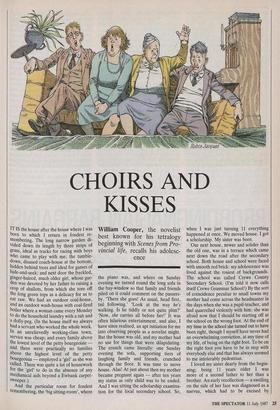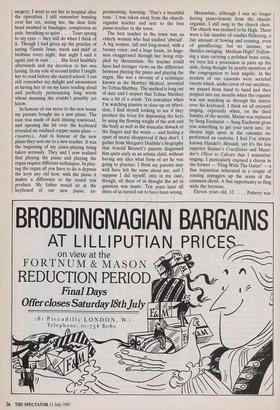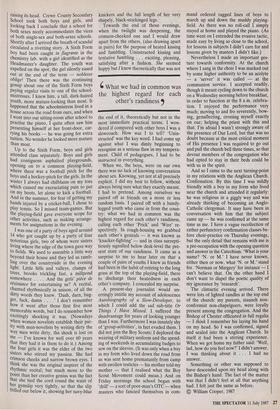CHOIRS AND KISSES
IT IS the house after the house where I was born to which I return in fondest re- membering. The long narrow garden di- vided down its length by three strips of grass, ideal as tracks for racing with boys who came to play with me; the tumble- down, disused coach-house at the bottom, hidden behind trees and ideal for games of hide-and-seek; and next door the freckled, ginger-haired, much older girl, whose gar- den was devoted by her father to raising a crop of shallots, from which she tore off the long green tops as a delicacy for us to eat raw. We had an outdoor coal-house, and an outdoor wash-house with coal-fired boiler where a woman came every Monday to do the household laundry with a tub and a dolly-peg. (In the house itself we always had a servant who worked the whole week. In an unrelievedly working-class town, service was cheap; and every family above the lowest level of the petty bourgeoisie — and there were practically no families above the highest level of the petty bourgeoisie — employed a 'girl' as she was called. There was quite a lot of housework for the 'girl' to do in the absence of any mechanical aids beyond a Ewbank carpet- sweeper.) And the particular room for fondest remembering, the 'big sitting-room', where William Cooper, the novelist best known for his tetralogy beginning with Scenes from Pro- vincial life, recalls his adolesc- the piano was, and where on Sunday evening we turned round the long sofa in the bay-window so that family and friends piled on it could comment on the passers- by. 'There she goes! As usual, head first, tail following.' Look at the way he's walking. Is he tiddly or not quite plim?' Now, she carries all before her!' It was often hilarious entertainment, and also, I have since realised, an apt initiation for me into observing people as a novelist might. But the house was old, and my mother had no use for things that were dilapidating. The crunch came literally: one Sunday evening the sofa, supporting tiers of laughing family and friends, crunched through the floor. It was time to move house. Alas! At just about then my mother became pregnant again — after ten years my status as only child was to be ended. And I was sitting the scholarship examina- tion for the local secondary school. So, when I was just turning 11 everything happened at once. We moved house. I got a scholarship. My sister was born.
Our next house, newer and solider than the old one, was in a terrace which came next down the road after the secondary school. Both house and school were faced with smooth red brick: my adolescence was lived against the rosiest of backgrounds. The school was called Crewe County Secondary School. (I'm told it now calls itself Crewe Grammar School!) By the sort of coincidence peculiar to small towns my mother had come across the headmaster in the days when she was a pupil-teacher, and had quarrelled violently with him: she was afraid now that I should be starting off at the school on the wrong foot. At the end of my time in the school she turned out to have been right, though I myself have never had an overwhelming conviction, at any time of my life, of being on the right foot. To be on the right foot you have to be in step with everybody else and that has always seemed to me intolerably pedestrian.
I loved my sister dearly from the begin- ning; being 11 years older I was more of a second father to her than a brother. An early recollection — a swelling on the side of her face was diagnosed as a naevus, which had to be excised by surgery; I went to see her in hospital after the operation. I still remember bending over her cot, seeing her, the dear little head swathed in bandages, complexion so pale, breathing so quiet. . . Tears sprang to my eyes — they still do when I think of it. Though I had given up the practice of saying 'Gentle Jesus, meek and mild' at bedtime every night, that night I said it again just in case . . . . She lived healthily afterwards and my devotion to her was lasting. In my role of second father I taught her to read before she started school: I can still remember my delight and amusement at having her sit on my knee reading aloud and perfectly .pronouncing long words whose meaning she couldn't possibly yet know.
In honour of our move to the new house my parents bought me a new piano. The case was made of dark shining rosewood, and opening the lid over the keyboard revealed an oxidised copper name-plate - CHAPPELL. And in honour of the new piano they sent me to a new teacher. It was the beginning of my piano-playing being taken seriously. They and I now realised that playing the piano and playing the organ require different techniques. In play- ing the organ all you have to do is depress the keys any old how: with the piano it makes a difference to the sound you produce. My father would sit at the keyboard of our new piano, ex- perimenting, listening. 'That's a beautiful tone.' I was taken away from the church- organist teacher and sent to the best piano-teacher in the town.
The best teacher in the town was an elderly woman who had studied 'abroad'. A big woman, tall and long-nosed, with a boomy voice; and a huge beam, its huge- ness exaggerated through her being crip- pled by rheumatism. No teacher could have had stronger views on the difference between playing the piano and playing the organ. She was a devotee of a technique known as the Matthay Method, invented by Tobias Matthay. The method is long out of date and I suspect that Tobias Matthay was a bit of a crank. Yet nowadays when I'm watching pianists in close-up on tdlevi- sion, I find myself looking to see if they produce the force for depressing the keys by using the flowing weight of the arm and the body as well as the muscular thwack of the fingers and the wrists — and feeling a spurt of moral disapproval if they don't. I gather from Margaret Drabble's biography that Arnold Bennett's parents diagnosed him quite early as an artistic child, without having any idea what form of art he was going to practise: I think my parents may well have felt the same about me, and I suppose I did myself; only in my case, though, all three of us thought the art in question was music. Ten years later all three of us turned out to have been wrong. Meanwhile, although I was no longer having piano-lessons from the church- organist, I still sang in the church choir. The church was inclined to be High. There were a fair number of candles flickering, a fair amount of bowing and crossing, even of genuflecting; but no incense, no thurifer-swinging. Medium-High? Follow- ing a man carrying a polished brass cross, we boys led a procession in pairs up the aisle, being thought by nearby members of the congregation to look angelic. In the pockets of our cassocks were secreted sweets which, under cover of our surplices, we passed from hand to hand and then popped into our mouths when the organist was not watching us through the mirror over his keyboard. I think we all enjoyed singing, expecially when, on the third Sunday of the month, Matins was replaced by Sung Eucharist — Sung Eucharist gives you something to get your teeth into. At chosen high spots in the calendar we performed an oratorio. I feel I've always known Handel's Messiah, yet it's the less superior Stainer's Crucifixion and Maun- der's Olivet to Calvary that I remember singing. I particularly enjoyed a chorus in the former— 'Fling Wide The Gates!' — a fine injunction reiterated in a couple of rousing arpeggios up the notes of the common chord. A fine opportunity to fling wide the larynxes.
Eleven years old, 12 . . . . Puberty was
raising its head. Crewe County Secondary School took both boys and girls, and looking back I conclude that a school for both sexes nicely accommodates the vices of both single-sex and both-sexes schools. Shortly after I arrived the breath of scandal circulated a rivetting story. A Sixth Form boy had been caught in flagrante in the chemistry lab. with a girl identified as the Headmaster's daughter. The youth was expelled on the spot, the girl silently eased out at the end of the term — noblesse oblige! Then there was the continuing gossip about one of the Sixth Form boys Paying regular visits to one of the school- mistresses. I knew him, a tall, dark-haired youth, more mature-looking than most. It happened that the schoolmistress lived in a house across the road from ours, and when I went into our sitting-room after school.to Practise the piano, I quite often saw him presenting himself at her front-door, car- rying his books — he was going for extra tuition. No wonder he looked more mature than most.
Up to the Sixth Form, boys and girls attended class separately. Boys and girls had contiguous asphalted playgrounds, Opening on to a common playing-field, Where there Was a football pitch for the boys and a hockey-pitch for the girls. In the winter I always had chilblains on my toes Which caused me excruciating pain to put on my boots, let alone to kick a football. And in the summer, for fear of getting my hands injured by a cricket-ball, I chose to play tennis. So I missed team-games. But the playing-field gave everyone scope for other activities, such as making arrange- ments for assignations in the evening.
I was one of a party of boys aged around 14 who got caught up by a party of four notorious girls, two of whom were sisters living where the edge of the town gave way to fields. We used to assemble a little way beyond their house and they led us ramb- ling over the countryside in the evening light. Little hills and valleys, clumps of trees, brooks trickling fast, a millpond somewhere . . . . And the girls' piece de resistance for entertaining us? A recital, Chanted rhythmically in unison, of all the dirty words they knew. 'Dash, darn, bug- ger, fuck, damn . . . I don't remember how it went after those first five most memorable words, but I do remember how excitingly shocking it was. (Nowadays When women novelists establish their par- ity with men-novelists by writing dirty the way men write dirty, the shock is lost on me — I've known for well over 60 years that they had it in them to do it.) Among the four girls it was the elder of the two sisters who stirred my passion. She had crimson cheeks and narrow brown eyes. I think she was the original inspirer of the rhyttunic recital; but much more to the Point than her creative genius was the fact that she tied the cord round the waist of her gymslip very tightly, so that the slip frilled out below it, showing her navy-blue knickers and the full length of her very shapely, black-stockinged legs.
Towards the end of those evenings, when the twilight was deepening, the crimson-cheeked one and I would draw apart from the others, (also drawing apart in pairs) for the purpose of heated kissing and fumbling. Uninstructed kissing and tentative fumbling . . . exciting, pleasing, satisfying after a fashion. She seemed happy but I knew theoretically that was not 4 What we had in common was the highest regard for each other's randiness the end of it, theoretically but not in the most immediate practical terms. I won- dered if compared with other boys I was a slowcoach. How was I to tell? 'Unin- structed' was the key word. I had come up against what I was dimly beginning to recognise as a serious flaw in my tempera- ment. Child of pedagogues, I had to be instructed in everything.
When we, the boys, were on our own there was no lack of knowing conversation about sex. Knowing, yet not at all precisely explicit. I did my best to follow, without always being sure what they exactly meant. I had to pretend. Among ourselves we paired off as friends on a more or less random basis. I paired off with a bandy- legged youth who came in from the coun- try: what we had in common was the highest regard for each other's randiness, calling each other 'Prick' and 'Wire' re- spectively. In rough-housing we grabbed each other's genitals — it was known as 'knacker-fighting' — and in class surrepti- tiously signalled below desk-level the pre- sent state of our randiness. It came as a surprise to me to hear later on that a couple of pairs of youths I knew as friends had been in the habit of retiring to the long grass at the top of the playing-field, there to discharge their heatedness in each other's company. I concealed my surprise.
A present-day journalist would un- erringly entitle my account of adolescence Autobiography of a Slow-Developer, to which I could add the sad sub-title Or Things I Have Missed. I suffered the disadvantage for years of looking younger than I was. Furthermore I was innately shy of 'group-activities', in fact evaded them. I did not join the Boy Scouts: I deplored the wearing of military uniform and the spend- ing of weekends in accumulating badges to sew on the sleeves. (It was only when a boy in my form who lived down the road from us was sent home prematurely from camp with swollen testicles — his mother told my mother — that I realised what the Boy Scout Movement could mean.) And on Friday mornings the school began with 'drill' — a sort of poor-man's OTC when masters who fancied themselves in coin- mand ordered ragged lines of boys to march up and down the muddy playing- field. As there was no roll-call I simply stayed at home and played the piano. (As time went on I extended the evasive tactic, made easy by living so close to the school, for lessons in subjects I didn't care for and lessons given by masters I didn't like.) Nevertheless I made an important ges- ture towards conformity. At the church where I sang in the choir I was marked out by some higher authority to be an acolyte — a 'server' it was called — at the communion service. I accepted readily, though it meant cycling down to the church on a Wednesday morning before breakfast, in order to function at the 8 a.m. celebra- tion. I enjoyed the performance very much; moving to and fro reverently, bow- ing, genuflecting, crossing myself exactly on cue; helping the priest with this and that. I'm afraid I wasn't strongly aware of the presence of Our Lord, but that was no doubt because at the most critical moment of His presence I was required to go out and pull the church bell three times, so that devout members of the congregation who had opted to stay in their beds could be with us in the spirit.
And so I came to the next turning-point in my relations with the Anglican Church. Confirmation. By this time I was mildly friendly with a boy in my form who lived near the church and attended it regularly: he was religious in a giggly way and was already thinking of becoming an Anglo- Catholic clergyman. It may have been in conversation with him that the subject came up — he was confirmed at the same time as me. I have a vague recollection of rather perfunctory confirmation classes be- fore choir-practice on Thursday evenings, but the only detail that remains with me is a pre-occupation with the opening question and answer in the Catechism. 'What is your name? 'N. or M.' I have never known, either then or now, what 'N. or M.' stand for. 'Norman or Margery' for instance — I can't believe that. On the other hand I don't want to dispel the poetic quality of my ignorance by 'research'.
The climactic evening arrived. There were lots of lighted candles at the top end of the church: my parents, staunch non- conformist non-chapelgoers, were loyally present among the congregation. And the Bishop of Chester officiated in full regalia — I think I remember his laying his hand on my head. So I was confirmed, signed and sealed into the Anglican Church. In itself it had been a stirring experience. When we got home my father said: 'Well, lad, how do you feel now?' I didn't answer. I was thinking about it . I had no answer.
Something or other was supposed to have descended upon my head along with the Bishop's hand. The fact of the matter was that I didn't feel at all that anything had. I felt just the same as before.
C) William Cooper, 1987




















































 Previous page
Previous page